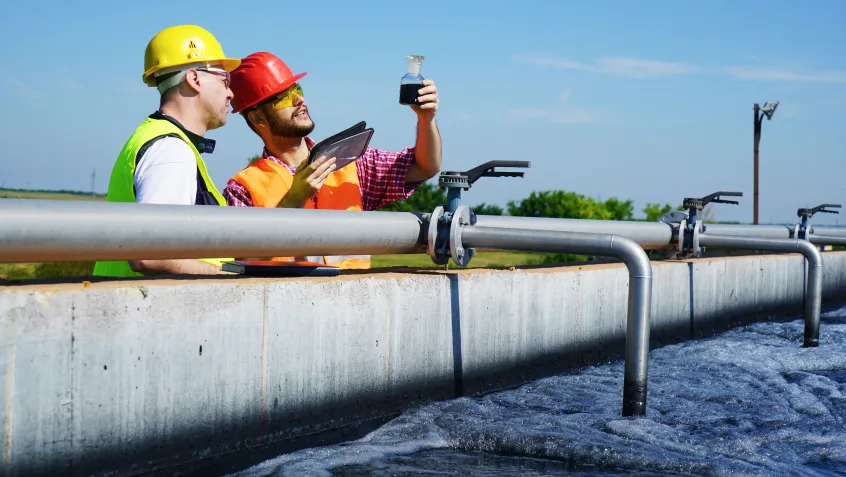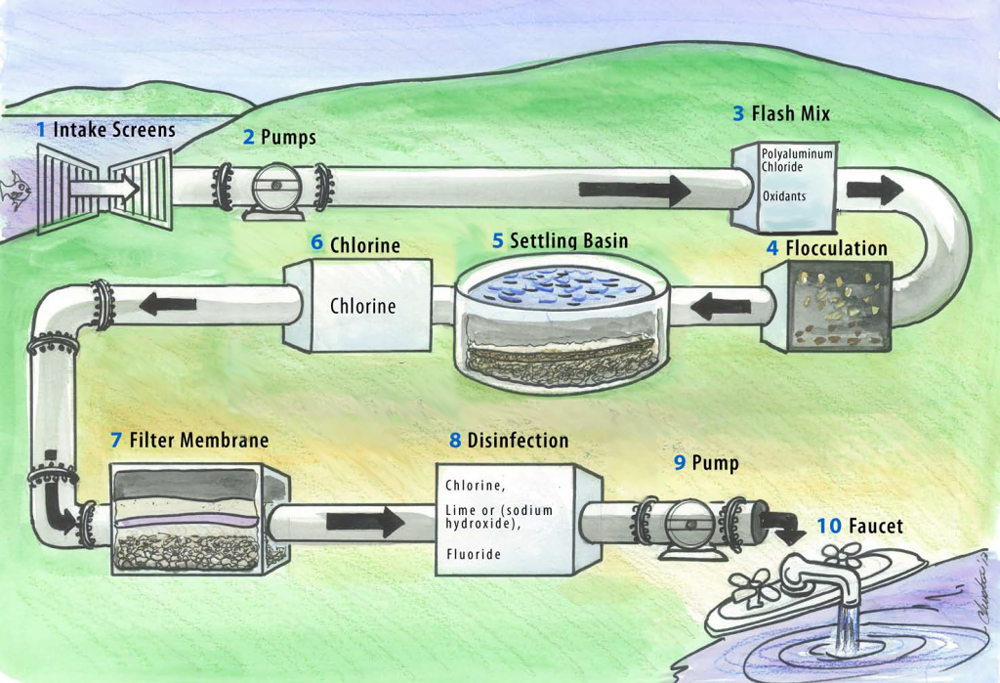How Water Technology Startups Are Solving the Global Water Crisis
Wiki Article
Exploring Water Technology Startups: How They Revolutionize Lasting Solutions
Water Technology startups are becoming essential gamers in the mission for sustainable solutions to global water issues. These companies utilize ingenious modern technologies to enhance water performance and monitoring. Their contributions attend to pushing obstacles such as deficiency and contamination. Regardless of their potential, they encounter numerous barriers that can impact their success. Understanding these characteristics clarifies the future of water sustainability and the duty these startups might play in shaping it.The Significance of Water Technology in Today's World
As global water deficiency heightens, the relevance of water Technology becomes progressively apparent. Water Technology plays an essential duty in resolving the challenges presented by boosting and lessening fresh water sources need. It incorporates a wide variety of developments, consisting of innovative purification systems, wastewater treatment technologies, and wise irrigation services. These advancements not only improve the efficiency of water use yet additionally promote sustainable methods across various sectors, including agriculture, industry, and urban development.In addition, the importance of water Technology expands past resource management. It cultivates resilience against environment adjustment influences, such as droughts and floods, by providing adaptive remedies for water conservation and administration. In addition, it sustains public wellness by making sure accessibility to safe and tidy alcohol consumption water. As the world deals with expanding water-related obstacles, the assimilation of advanced water innovations is important for fostering sustainable advancement and safeguarding water availability for future generations.
Cutting-edge Solutions From Water Technology Startups
While traditional strategies to water monitoring have actually offered their purpose, a brand-new wave of water technology start-ups is reinventing the industry with cutting-edge services (Water Technology Startups). These business utilize innovative technologies to deal with pressing water concerns, such as scarcity, contamination, and inefficient circulation. Numerous start-ups use expert system and device learning to maximize water use and forecast demand, resulting in even more lasting methodsFurthermore, several firms concentrate on establishing innovative filtration systems that remove toxins and make water secure for intake. Others check out decentralized water treatment technologies, allowing neighborhoods to manage their water resources better. Furthermore, some start-ups are pioneering smart irrigation solutions that reduce water waste in farming, advertising environmental preservation.
Instance Studies: Effective Water Technology Startups
Countless water Technology startups have become leaders in dealing with global water difficulties via ingenious approaches. One significant instance is Xylem, which focuses on water analytics and smart infrastructure to enhance water usage and reduce waste. Their remedies have actually been carried out in numerous towns, showing significant renovations in water monitoring efficiency.One more successful startup, No Mass Water, has actually created solar-powered hydropanels that draw out water vapor from the air, giving lasting alcohol consumption water in deserts. Water Technology Startups. This Technology has been deployed in a number of countries, making sure areas have access to tidy water
Last But Not Least, AquaVenture Holdings operates a diverse portfolio of water-as-a-service solutions, resolving water scarcity with desalination and wastewater treatment. Their projects have actually confirmed essential in regions encountering extreme water scarcities, showcasing the potential of innovative water technologies to develop long-term, positive influences. These study highlight the transformative capacity of start-ups in the water Technology industry.
The Function of Smart Technology in Water Administration
Smart Technology plays an important role in modern water administration by leveraging IoT applications to optimize source usage. Information analytics improves performance by providing actionable insights, while remote tracking solutions make it possible for real-time oversight of water systems. Together, these technologies transform just how water is taken care of, advertising sustainability and operational efficiency.IoT Applications in Water
As water shortage and monitoring obstacles escalate around the world, the assimilation of Net of Things (IoT) applications has become an essential solution in maximizing water resources. IoT Technology assists in real-time tracking and evaluation of water systems, allowing more reliable use and management. Sensing units deployed in different water infrastructures can track quality, circulation prices, and leakage, providing valuable data to stakeholders. This information equips utilities and consumers to make informed choices, reducing waste and improving conservation initiatives. Additionally, clever irrigation systems utilize IoT to enhance water delivery for farming, ensuring that crops obtain the ideal amount of water at the appropriate time. Generally, IoT applications are changing typical water administration practices, cultivating sustainability and resilience in water source systems.Data Analytics for Effectiveness
Taking advantage of data analytics is essential for improving effectiveness in water management. Water Technology startups are increasingly making use of sophisticated analytics to maximize source appropriation and decrease waste. By assessing data from numerous resources, these start-ups can identify patterns and trends that educate better decision-making. For example, predictive analytics can anticipate water demand, allowing energies to change supply appropriately, thereby decreasing surpluses and shortages. Additionally, real-time data handling allows the prompt detection of leaks and inefficiencies within distribution systems, significantly decreasing operational expenses. Furthermore, data-driven understandings equip stakeholders to carry out targeted preservation methods, cultivating lasting practices. Fundamentally, incorporating data analytics into water management not only enhances operations however likewise advertises long-term sustainability in water source usage.Remote Tracking Solutions
While traditional water administration systems often deal with inadequacies, remote surveillance remedies are transforming exactly how water resources are handled. These cutting-edge technologies allow real-time data collection and evaluation, allowing stakeholders to keep track of water top quality, circulation rates, and use patterns from afar. Using sensing units and IoT gadgets, remote tracking supplies prompt insights that assist in aggressive decision-making. This change not just enhances operational efficiency but likewise advertises sustainability by reducing water waste and enhancing resource allocation. Additionally, remote surveillance systems can determine potential concerns prior to they intensify, thereby reducing the danger of contamination or infrastructure failure. As water Technology start-ups remain to develop these services, the sector is positioned for substantial developments in lasting water management techniques.Obstacles Encountering Water Technology Startups
Water Technology start-ups come across considerable challenges that can prevent their development and success. Trick problems consist of protecting sufficient financing, maneuvering through complex regulative atmospheres, and competing in a crowded market. These barriers call for critical preparation and innovation to get rid of.Funding and Investment Obstacles
Advancement in water Technology holds immense potential for attending to worldwide obstacles, startups in this field frequently face significant funding and financial investment hurdles. Numerous investors continue to be mindful, viewing the water industry as high-risk as a result of its complicated regulative landscape and long advancement timelines. Furthermore, start-ups usually struggle to demonstrate immediate success, which can deter potential backers. Traditional venture funding might neglect water innovation, favoring markets with quicker returns, such as technology or durable goods. In addition, safeguarding grants and government funding can be competitive and lengthy, more complicating economic security. Water Technology Startups. As an outcome, many ingenious water Technology start-ups locate themselves in a perilous position, needing creative funding techniques to navigate these financial barriers and achieve their objectivesRegulatory Compliance Issues
Guiding governing compliance is a significant difficulty for startups in the water Technology field, as they must face a myriad of regional, national, and worldwide laws. These guidelines typically incorporate water quality criteria, environmental security laws, and safety and security protocols, which can differ widely throughout jurisdictions. Startups might find it tough to navigate this complicated landscape, especially when scaling operations or entering new markets. The costs linked with compliance can be substantial, drawing away sources far from technology and product growth. Furthermore, delays in obtaining required authorizations or certifications can prevent development and market access. A robust understanding of regulative structures is essential for these start-ups to guarantee sustainable procedures and prevent prospective legal repercussions.Market Competition Characteristics
As water Technology start-ups emerge in an affordable landscape, they face various difficulties that can hamper their development and innovation. Developed companies frequently dominate the marketplace, leveraging sources and experience to preserve their placements. Startups fight with restricted financing, which limits research study and growth capacities, making it difficult to contend on Technology and rates. In addition, the quickly developing nature of water innovations demands constant adjustment, more straining startup sources. Regulatory obstacles can make complex market entry, as conformity with my company environmental requirements is essential yet pricey. Lastly, drawing in proficient ability in a particular niche field offers an additional obstacle, as larger firms may offer more attractive employment bundles. Consequently, these variables create a complicated setting for water Technology start-ups aiming to do well.The Future of Water Technology and Sustainability

The future of water Technology will likely focus on integrating fabricated knowledge my link and data analytics to optimize water distribution and use patterns. By taking advantage of real-time information, firms can forecast shortages and take care of resources better. Sustainable techniques will certainly end up being a keystone of the sector, encouraging circular economies where water is reused and treated. Ultimately, the ongoing development of water Technology will be important in creating resilient facilities with the ability of fulfilling the difficulties postured by climate change and population development while advertising environmental stewardship.
Frequently Asked Concerns
What Are the Trick Metrics for Evaluating Water Technology Startups?
Key metrics for evaluating water Technology startups consist of market capacity, scalability, consumer procurement expenses, income development, technology innovation, regulatory conformity, ecological impact, competitive benefit, and group competence, all critical for identifying long-lasting stability and success.How Can Individuals Support Water Technology Innovations?
Individuals can support water Technology developments by purchasing start-ups, supporting for policy changes, joining neighborhood efforts, sharing expertise concerning lasting techniques, and advertising recognition of water concerns via social media and local events.What Are Common Financing Resources for Water Technology Startups?
Usual financing resources for water technology startups include equity capital, government grants, crowdfunding systems, angel financiers, and business partnerships. These financial avenues help promote technology and growth in lasting water monitoring innovations.
Which Industries Advantage Many From Water Technology Advancements?
Industries such as agriculture, power, manufacturing, and community services benefit significantly from water Technology advancements. These innovations enhance water performance, minimize costs, and advertise sustainable practices, inevitably adding to environmental preservation and resource monitoring.Exist Any Governing Difficulties Specific to Water Innovation?
Yes, water Technology faces governing difficulties, consisting of compliance with ecological requirements, allowing processes, and differing regional laws. These complexities can prevent advancement and slow the application of brand-new innovations in the water site web monitoring industry.Water Technology start-ups are emerging as essential players in the pursuit for sustainable options to global water problems. As international water scarcity escalates, the significance of water Technology comes to be increasingly evident. Others discover decentralized water treatment innovations, permitting communities to manage their water sources more successfully. An additional successful startup, Absolutely no Mass Water, has actually developed solar-powered hydropanels that draw out water vapor from the air, giving sustainable drinking water in arid areas. Their tasks have confirmed important in areas encountering extreme water shortages, showcasing the capacity of ingenious water modern technologies to develop lasting, positive effects.
Report this wiki page